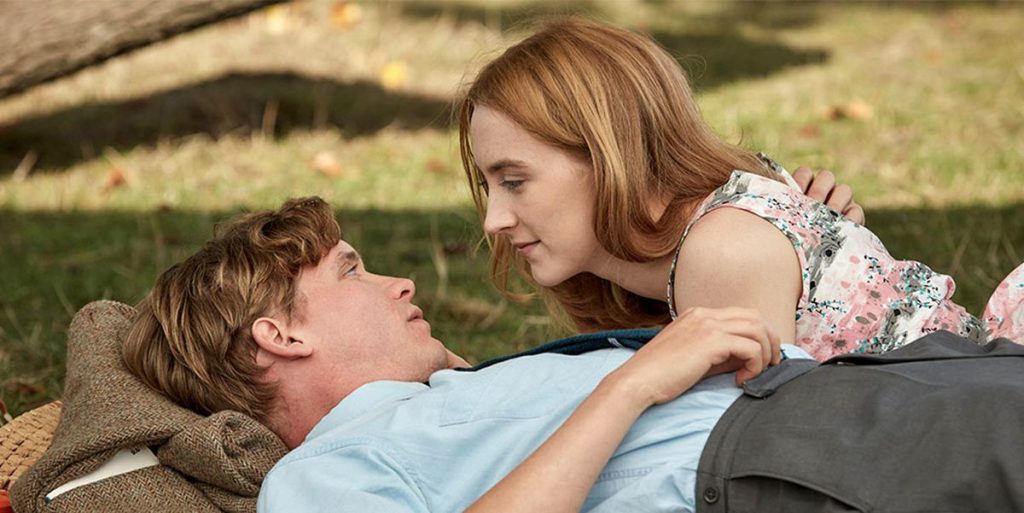
All movies have a love story—I don’t say that in vain, in college I had two screenwriting professors (both working, agented and credited) who hammered the point home “Every movie has a love story—remember that, Mr. Cobb.”
“I understand.”
“Do you? Because I’m sixty pages into your college-student-with-a-shotgun script and I haven’t detected a note of romance—AND the main character groping his lit professor at gunpoint DOESN’T COUNT!”
Well, ex-key-use me. I guess my metaphor about the capital gains tax was a little too hip for the room.
But the fact remains, Dean’s List/Dead List suffered for the lack of appeal to the fairer sex. But does that mean the word ‘every’ really means ‘every’–yes, they say, so I say fine, but does that mean that every movie is a romance? Certainly not. So, what makes a film a romance rather than a movie merely with a romantic element?
Proportion.
What’s the pie-graph of rom-coms look like? On average, something like this:
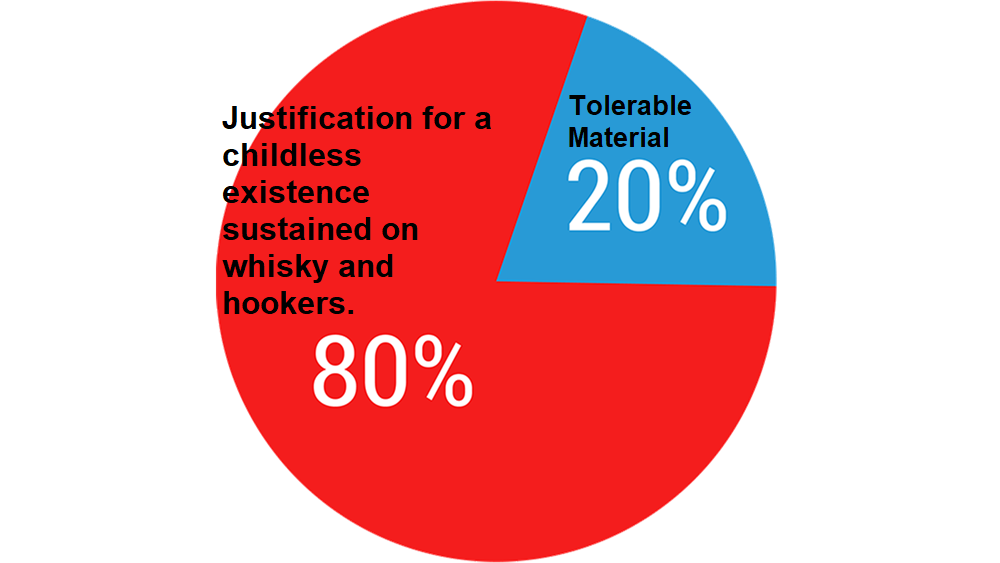
Romances, especially rom-coms, are mind-numbing reasons to hate women, they are unwatchable from a guy’s perspective, speaking as a guy who tried six times to like Sex and the City. A man, properly testosteroned (it’s a word) and tuned, will not be able to discern the character’s motivations in a Rom-com, will not be able to detect the actual story, will not perceive the underlying assumptions of the narrative and will therefore let his eyes roll back in his head in response to the slow jellification of his brain.
But being a fair and egalitarian sort, I recognize the same phenomena in reverse, ask any woman what Sgt. Barnes was truly thinking when he was in the bunker with Elias’ friends just after he fragged him– you remember, the “You Think You Know About Killin’” scene. Nine times out of ten you will get the wildest misinterpretations of Barnes from the women in your life. Why? Because they’re not men and instinctively don’t understand the posturings of dominance on display in that bunker, the subtleties of speech or the Machiavellian tactics Barnes employs to, basically, shut down resistance to his authority.
Movies understand the masculine contempt for gooey, cuddly kissy schtick, they know they can’t get away with much of it…
Unless they trick us.
And we can be tricked, hell, we wanna be tricked—ever try a wheat grass salad? Two bites in and you’d rape a VW bus for some ranch dressing—but ‘no’, you have ‘arteries’ and they are ‘coated in plaque’ and you have to taste every Nazi mouthful or it ‘loses its antioxidants’ or something.
Thankfully, there’s still men in the world and some have the good sense to mask our oat porridge in a thick layer of maple syrup, so the nag next to us can feel fulfilled in her Florence Nightingale fantasy without erasing our cumulative memory of eggs and butter.
That maple syrup has been ingeniously applied several times to several great films. So, for your movie-going mercy, here’s a list of the best romantic movies disguised as good ones. Make her think it’s the romantic element that fueled your choice, she’ll believe it because she wants to.
For the purposes of our list, I’ve estimated the proportion of romantic material to tolerable material, in other words the ratio of * gick *to * ahhh*, and use it to define a ‘romantic movie’ as any film with 50+ percent squishy sentimental dreck. That’s not to say that in these films the squishy, sentimental dreck isn’t entertaining, that’s the point, through skill of writing, directing and, usually, forbearance of producing the romantic quotient of these films have been rendered tolerable and the film therefore rendered ‘good’, it is a rarity and should be appreciated.
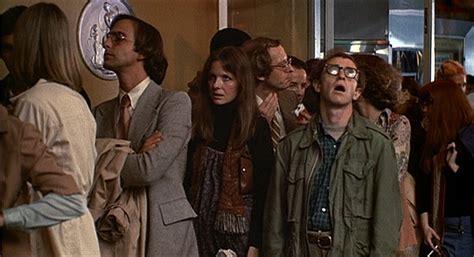
“Kevin Costner and Ryan Reynolds compete for the love of…Lena Dunham?! Written and Directed by Lena Dunham?! She called her character ‘Lisa Durham’?! Christ, it’s three hours long!”
10) Annie Hall (80/20)
“Guy goes into a psychiatrist’s office, he says ‘My brother’s driving me nuts, he thinks he’s a chicken, all night he’s up clucking, I don’t know what to do.’ The psychiatrist says ‘Just kick him out.’ The man thinks for a second then shakes his head, ‘I would, Doc, but I need the eggs.’”
Such is Woody Allen’s analysis of romantic relationships—after two hours of flashback about an awkward courtship with Annie Hall (Diane Keaton), a relationship that ultimately ends and we are now experiencing the disappointment of that relationship’s male half in Woody Allen, as he recalls the negative and the positive of the getting of a woman, the keeping of a man and the point at which both decide to dissolve the association, the film makes a statement by asking a question then answering it: If romantic pairings result is madness, stress, inconvenience and claustrophobia why even get into one at all? to which the film eventually answers, shrugging ‘Because we need the eggs.’
It is a funny and watchable romantic film, with minimal cringe and high philosophical value.
Plus, flat-chested, whiny Diane Keaton who looks like a cat that fell in the toilet for most of the flick is ideal for warding off your girl’s suspicion that you have a thing for the female lead, so bonus.
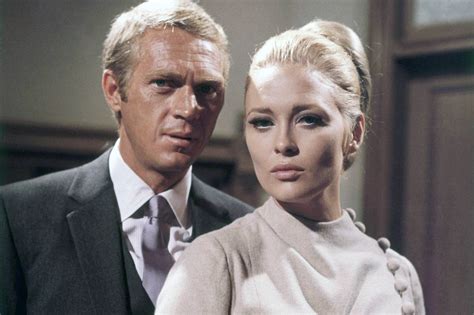
A circle in a spiral/ a wheel within a wheel/the leading man professes love in a never ending shpeel/ the girl comes off as shallow because of the abuse she was shown/ can she learn to love again or can we just go home/ these are the bromides that you find/ when you give rom-coms the green light
9) The Thomas Crown Affair (70/30)
Take your pick: the Steve McQueen version or the later Pierce Brosnan version of this story wherein a dashing art thief is pursued by an intrepid insurance investigator who can’t help but fall in love with the clever criminal, he is smitten by this damsel of honest trade and shamed into living square while givin’ her the business all-rough-like. The reason women love romantic movies is they put themselves in the place of the female lead, the trick to this movie’s tolerability is you give both men and women someone they’d like to be, ain’t a dude that doesn’t wanna stick it to the man for millions right in his sour face, and there ain’t a woman who doesn’t dream of civilizing a bad-boy genius with balls big as church-bells who will only abandon his life of crime for her–’cuz her vajayjay’s so friggin’ awesome, I guess.
Most of the film is the wink/nod/dude-caught-in-his-t-shirt romantic pap, but which is made watchable in that we’re watching who’s playing whom, art thief knows who she is, insurance detective knows he knows who she is—[effete British accent] oh, how the sexual tension is just so scrumptious, gets me right in my wiggle-bits.
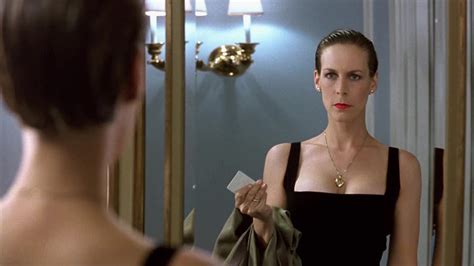
Spanx? Check. Falsies? Check. Corset? Check. Six-inch heels, butt brace, Thigh gap calipers? Check, check. check. Okay, let’s make this the best church production of Glengarry Glen Ross ever!
8) True Lies (67/33)
Bored housewife (Jamie Lee Curtis) has a boringer (also a word) husband (Arnold Schwarzenegger) until she finds out he’s a secret agent and has put a ruse on their marriage for years to cover up his exciting secret. Of course, once the truth is out, he realizes his wife is a sexy secret-agent lady piece of tail and she’s smart and she’s resourceful and-and-and she’s a bad ass and she should be included in his cool, exciting work and hey, they were the perfect bad ass couple all along.
That said, it’s a pretty decent spy flick even if it leans a little heavy on the James Bond Bag-O’-Tropes to get it’s bad-assery over. Quite enjoyable, and look for a surprisingly competent performance by Tom Arnold, and a kick-ass cameo by Charleton Heston.

“She must remember this/ if a chick flick is what she picks/ most men would rather die/–he’s just trying get laid later/ so put out or watch sci-fi.”
7) Casablanca (61/39)
The great thing about Casablanca: woman fawn over the will-they/won’t-they romance of Humphrey Bogart and Ingrid Bergman, add to that the perennial fantasy of being fought over by two men, one of them a hero in the white-capped-teeth sense as compared to Bogart’s dark brooding less-than-square but roguishly daring past and you have a female viewer all a-titter over how wantable she/Bergman is.
What keeps male viewers from self-immolation is the intrigue of the corrupt Vichy police, their cowardly cooperation with the Nazis who breeze into town to swing their dick and Bogie, the hated by the Nazis, adored by the resistance, having earned honorary status as a criminal aristocrat in this sun-burnt land of hucksters all the while riding the thinnest of lines in a murderous intrigue involving a cool detail like two ‘letters of transit’–it’s just that level of ‘thingyness’ that drives men wild. Admittedly the movie slows to a miserable crawl when Bergman confronts ex-lover Bogart to give her those letters of transit so she and the Darling Boy can leave, but once you make it through that, it’s a cavalcade of secret meetings, Nazi shootin’ and piano music, which everybody loves.
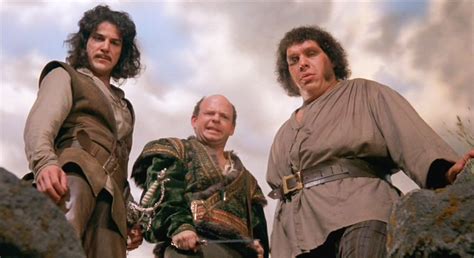
“I don’t get it, he just dropped, then he started babbling—I hear ‘Trump’, I hear ‘election’–Oh man, what if saw the future and—he’s swallowing his tongue! give me your wallet! You gotta spoon! I need a spoon for Mr. Reiner!”
6) The Princess Bride (60/40)
Farm Boy and Buttercup are separated, Farm Boy’s killed, Buttercup is betrothed to the greedy, murderous, cowardly Prince Humperdinck—who wants a war with another country and so plans the murder of his new bride in a kind of Gulf of Tonkin maneuver to infuriate the masses. He hires three thugs to do the dirty work, which they almost accomplish, but on their way to strangle the young lady they find themselves pursued by a mysterious ‘man in black’. He defeats the swordsman Spaniard, the Giant Frenchman and the Sicilian mastermind, then reveals himself to Buttercup to be none other than the Dread Pirate Roberts—the same man who murdered Farm Boy.
It’s a pretty bitchin’ plot, so bitchin’ you barely notice that it’s full of languid kissing shots and dripping oaths of eternal love that dot each scene like dribbles of vinaigrette that then surround the whole chop in a purple moat of gunk. Why? Just ‘why’?
But have no fear, the swashbuckling plot, the dead pan humor and positively THE best swordfight scene in film history will spare you the eye-rolling tedium of listening to every character pontificate on the meaning of true love from opening credits to final fade to black.
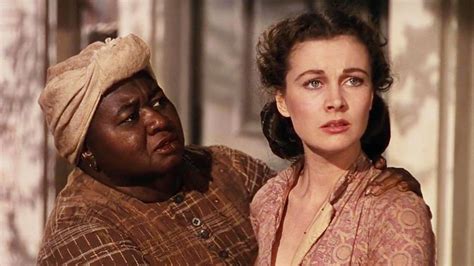
“Don’t be sad-none, Miss Scarlett. You shouldn’t be embarass- lottsa white folk can’t do the ney-ney.“
5) Gone With The Wind (59/41)
Men don’t get women’s obsession with the non-Rhett Butler, non-civil war, non-ball-gown-made-out-of-drapes portion of this movie, but thankfully Vivian Leigh’s obsession with the one man she can’t have and then her seduction by a roguish social climber and the final realization that he may have been crooked, but he wasn’t wicked, she was and he saw that in her and showed her the appropriate contempt—whilst marrying her and having a child with her.
And he leaves her in the most stoic way possible, by saying he never gave a damn about her stupid house and her stupid cousin and her stupid family’s legacy and her stupid poonanie to boot—his daughter was dead and he couldn’t bear to look at this scheming, conniving war-trollop a second longer. Bonus: Leg-amputations without benefit of whisky, and shooting rape-Yankees in the face when they get a little too familiar.
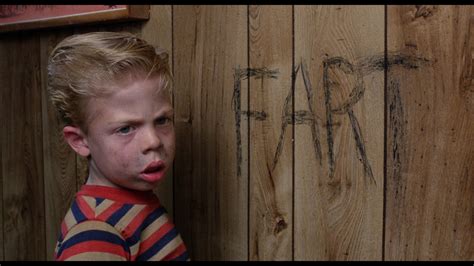
“They say critical theory is gutting the school system, but since the curriculum was re-standardized, Buford’s been in the top of his privilege-group all year.“
4) Raising Arizona (52/48)
The Coens make everything a wry observation on the smallest building block of human existence: marriage, parenthood, region, accent, unfinished furniture and for a movie that is half a treatise on love: husband for wife, parent for child, criminal for crime, and criminal for criminal, it is more than engrossing caper film, which is also a rom-com.
Career criminal marries cop, cop-lady is barren, they decide to kidnap one of a famous quintet of babies sired by local celebrity, Nathan Arizona (nee Huffheinz) while everyone and everything conspires against them, who thought kidnapping a rich man’s infant/toddler son would be such a travail. Everybody falls in love with this baby, they all try to kidnap him, Nicholas Cage’s friend from work, the two jailbird bros who ‘released themselves on their own recognizance’ and Randall Tex Cobb, the ‘Lone Biker of the Apocalypse’, for fifty thousand dollars he tries to extort from Nathan Arizona.
After all the prison escapes, bank robberies, car chases, errant grenade ignitions and the cryptic appearance and reappearance of a roadrunner tattoo, you’d almost believe that what you watched wasn’t a very gooey observation on a mismatched pair falling in, then out, then in love again.
Save this for when it’s her turn to pick and you just can’t bear another costume drama in England where a lady looks out of the window for forty minutes, usually, during the Crimean War.
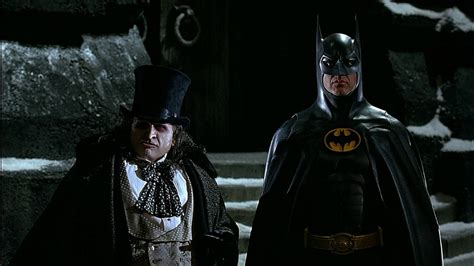
[snort] Women.–I know right?–Right?–Women.–You said a mouthful.–Preachin’ to the choir.–You said it.–Women.–[snort] Women.
3) Batman Returns (51/49)
I can feel your shock. But think back and tell me most of that movie was not Rich, Disgruntled loner saves bitter damsel, understands her then offers to marry her and give her a castle—THEN tell me the other plot isn’t ugly man thinks I owe him some slap-and-tickle and the other plot isn’t Rich man whom I slaved-for tried to murder me but gets his comeuppance via my new brooding boyfriend who can totally beat you up. See.
The trick involved here is wrapping the tedious career girl character in latex and having the brooding hunk who’s rough on the outside but inside is good because he thinks I’m pretty even though I wear a mask, into Batman, the patron saint of boys age 8 to 80. We get a Batman picture; they get a damsel rebukes men for inconsiderate treatment but gets loved anyway by Richie Rich-Bat in the process. See girls, there’s a disturbed 30-year-old orphan for everybody…and he has secrets, oh-so-many secrets. * gee-gee *

“Do you tip, or should I tip? You asked me to come along. In those situations its customary for the cop to tip.–I never would’ve come if I thought I had to go over 15%. See. See. I knew this was—we’re going dutch!”
2) Heat (51/49)
It seems like the secret to tricking us is to make the male leads into demonstrable bad-boys, but not bad-boys as written by women—bad-boys written by women are usually a motor-cycle riding, leather-jacket-wearing male ballerina who dances like Fury to rid himself of the guilt of his past/ his abusive childhood/ his short time in prison * sniff * Beautiful.
No, actual high-level bank and armored-car thieves, replete professionals whose wives and girlfriends have little or no knowledge of just what they get up to everyday. And not just them, he cops chasing them, they have serious problems with the ladies in their life, too. Everybody’s revealing everything as cops close in and men make the decision to leave their women and chase some invisible white rabbit girls don’t understand. Mea Culpa.
Heat has a great shootout—possibly the best shootout this side of Iwo Jima, the cat-and-mouse relationship between the cops and the crooks is riveting, but dammit, they spend half the movie arguing with their wives in a what-about-me dramatic tone. Women adore this, the whole thing is a romance anthology between each crook and his wife, with a little tightly-executed crime to keep us from mixing pills with vodka.
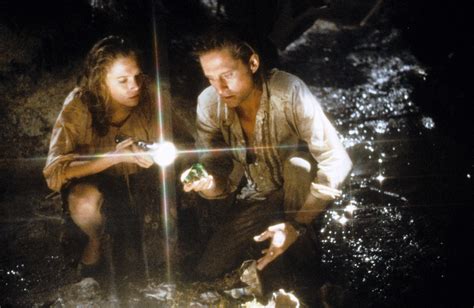
[Producer’s Note: quick rewrite needed in act three] “I give you ‘Piedra Renal de los Dioses.’ Kidney Stone of the Gods.”
1) Romancing the Stone (50/50 or 100/100 depending)
Not only is Romance in the title and the female lead is a frumpish novelist who gets sent a map to a treasure by her sister who she must then save by bringing the map to Columbia to pay her ransom, but I say again—the word ‘Romance’ is in the title.
When the novelist gets assaulted in the middle of nowhere, she gets saved by the [sigh] roguish loner bad-boy glistening with tropical sweat in his sleeveless [jeezus!] outback shirt wielding a machete and a shotgun and is engaged in [chryst!] bird poaching. Women don’t want you to be murderers or anything, just scofflaws: smugglers or poachers or card cheats, nothing heavy, just mildly felonious, that’s what they want.
It’s Bird Man’s idea for them to go after the treasure themselves, which they find and through many close calls they escape, having saved her sister, but getting separated as he goes further to get, in this case an emerald, the treasure, which at the last minute gets eaten by a gator.
But their love was true you see, because who shows up on a big yacht with brand new alligator boots. Why the archetype of man she always wrote about, yada-yada-yada,
That said, this is a fun movie. She may be ovulating like a tribble at all the coy trust-don’t- trust deliciousness of their adventure, but it has more than enough for us, in the treasure hunt, in the exotic locale and for Michael Douglas’ best line “Bridge? That’s not a bridge, that’s damn pre-columbian art.”
Leave a Reply